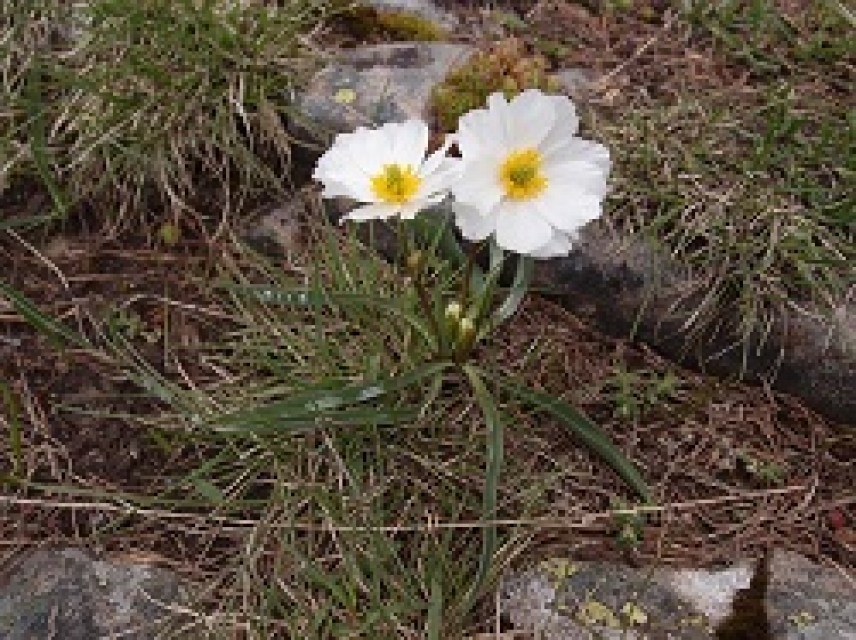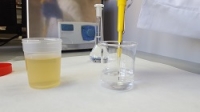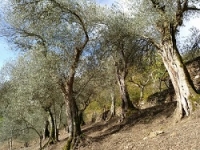Being asexual in the Alps is an evolutionary advantage for survival
Escrito por UCC+iAn international team explains why specimens of an Alpine flower that reproduce without fertilization are more widespread than their sexually reproducing counterparts
At between 5 and 20 centimeters long, it has white flowers and is the Alpine version of the yellow-flowering Mediterranean buttercup. Ranunculus kuepferi, though fragile in appearance, is one of the plant species that has best adapted to extreme conditions, such as high mountain climate. For thousands of years now, these flowers have decorated the valleys of Europe’s tallest mountains, which are home to more than 30,000 wild species. Learning how this plant adapted and survived could help better understand how living beings respond to changes on Earth. In the case of Alpine buttercups, the key seems to be found in how they reproduce, according to a research project carried out by an international team which included University of Cordoba Botany Professor Diego Nieto Lugilde.
A biochemical process in plants is imitated to curb the reproduction of colon cancer tumor cells
Escrito por UCC+iA University of Cordoba research team has developed a tool to erase molecular tags that silence genes involved in tumor growth
Plants have provided a new avenue in curbing tumor growth. On this occasion, it doesn’t involve miracle species or the like, but rather the results obtained by the University of Cordoba BIO301 research team called "Epigenetics and DNA Repair." This research team is affiliated with the Maimonides Institute of Biomedical Research and is led by Genetics Professor María Teresa Roldán Arjona.
Comments on social networks also reinforce socialization during adolescence
Escrito por UCC+iWithout overlooking the risks of using social networks in adolescence, a study analyzes little known information about cybergossiping among high school students
Cybergossiping occurs when two or more people make evaluative comments on a digitial device about a third person who is not present. This kind of online behavior is common among adolescents when they are instant messaging and on social networking sites. Cybergossiping directly impacts the group, and can just as easily foster as damage the quality of the relationships among its members.
A tool based on the use ofcarbon nanoparticles enables detection of antidepressants in urine samples
Escrito por UCC+iThe test can be used to monitor therapeutic dosages, for cases of intoxication due to overdose or at a forensic level
A University of Cordoba research group has designed a tool that enables detection of antidepressants in urine samples in low concentrations. This new method is based on the developmentof a new material, based on carbon nanotubes, on the inside of pipette tips, the kinds that are normally used in analysis laboratories.
A scientific study characterizes two new Galician olive varieties for the first time
Escrito por UCC+iThe research, done in collaboration with the University of Cordoba, recognizes the potential and high quality of these olive oils
Olive oil is a key element and one of the main sources of fat in the Mediterranean diet. Olive oil is remarkable for its nutrients and Spain has the honor of being the number one producer of this “liquid gold.” Though most Spanish olive oil production takes place in Andalusia, over the last few years other regions within Spain have begun to produce high quality olive oil, using their own varieties native to those regions.
The social media are undermining young people’s self-esteem
Escrito por UCC+iA study by the University of Córdoba shows how use of the social media by young people adversely affects their self-perception of body image, and links this phenomenon to eating disorders
The social media are part of our everyday lives, enabling new methods of communication, improved access to information and even the development of new working strategies, in a range of fields including education. Yet the use – or abuse – of social media has also given rise to a number of problems, particularly among the most exposed sectors of the population.







